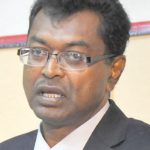No delaying tactics with no-confidence motion – PM
PRIME Minister and Minister of Parliamentary Affairs, Mr. Samuel Hinds, has rejected the assertion that the current Administration is employing delaying tactics ahead of the debate on the much-talked-about no-confidence motion.
The Alliance For Change’s (AFC) no-confidence motion was submitted to the Clerk of the National Assembly at the beginning of August.
There has been some chatter among the opposition parties that the Administration has a hand in activities that seek to undermine the advancing of the proceedings related to the motion.
The most recent was the allegation made by AFC Leader, Mr. Khemraj Ramjattan. He claimed that there was a proposal by the ruling People’s Progressive Party/ Civic (PPP/C) to “buy out” Members of Parliament (MPs) from A Partnership for National Unity (APNU) at $30M each, in exchange for their opposition to the no-confidence motion. This has been denied by both the ruling party and the main Opposition party.
Mr. Hinds stressed.
“I expect that when Parliament resumes the motion will be on the Order Paper and then we shall see where things go from there.” — Minister of Parliamentary Affairs, Mr. Samuel Hinds
Additionally, the Speaker of the National Assembly, Mr. Raphael Trotman, when asked, stated that he has no knowledge of any requests being made by the current Administration for the debate on the no-confidence motion to be delayed.
However, he added that decision as to what constitutes the agenda of Parliament is the responsibility of the Clerk of the National Assembly, Mr. Sherlock Isaacs.
Isaacs has not confirmed any such move by the current Administration.
FIRST INKLING
Meanwhile, the first inkling the public had that the AFC had planned moving a no-confidence motion against the Government was way back in mid-June, when party Vice-Chairman, Mr Moses Nagamootoo, hinted at it.
He did so by way of an article published in the Stabroek News and headlined: “AFC considering no-confidence motion against Gov’t.” He, however, acknowledged that to do so would require the support of the main Opposition party, A Partnership for National Unity (APNU).
The AFC finally got its wish on Tuesday, August 5, when APNU Leader, Brigadier (rtd.) David Granger, publicly confirmed that his party was fully behind the no-confidence motion.
The first page of the Motion reads: “Be it resolved that this National Assembly has no confidence in the Government.”
As stated in Section 106 (6) of the Constitution: “The Cabinet and President shall resign, if the Government is defeated by the vote of the majority of all Members of the National Assembly on a vote of confidence.”
This is made even clearer in Section 106 (7), which states: “Notwithstanding its defeat, the Government shall remain in office, and shall hold an election within three months, or such longer period as the National Assembly shall, by resolution, supported by no less than two-thirds of all elected members of the National Assembly, and shall resign after a new President takes the oath of office following the election.”
INDICATIONS OF UNCERTAINTY
Since the motion was submitted to the Clerk of the National Assembly, however, there have been indications of uncertainty in the Opposition camp.
While the AFC stands firm on their position regarding a move to general elections via a no-confidence motion, the APNU has been agitating, with increasing vigour, for local government elections. This move was advanced despite APNU’s expression of support for the no-confidence motion which, if passed, would see Guyanese returning to the polls for general elections.
Earlier in the week, protests followed the expiration of an ultimatum to President Donald Ramotar by APNU Leader, Brigadier (rtd) David Granger.
The APNU Leader called on the Head of State to set a date for local government elections before September 15 or face the “mobilization of national and international” support by the party to ensure the elections are hosted.
However, President Ramotar is holding fast to his position, in that he needs for Granger “to clarify what precisely” is his party’s position before he can “properly respond” to his letter, since he, Granger, was saying one thing, and his party another.
In his reply, by letter, to Mr. Granger last Thursday, President Ramotar requested that the APNU Leader be specific as to what his party wanted – general elections or local government elections.
If the impending debate on the no-confidence motion favours the AFC, there will be a move to the former. The timeline of events could, therefore, not allow local government elections to be held first. Also, the Guyana Elections Commission (GECOM), has indicated that if it is required to facilitate local government elections, its workplan spans six-months. For general elections, a three-month period is required by the Commission, between the calling of such an election and the actual Election Day.
READY FOR ELECTIONS
Additionally, President Ramotar had repeatedly made clear that his Government is ready for any election process.
“It is absolute nonsense (that the Government is worried)…for us it does not matter which election comes first. We are prepared for any elections, local government or general elections,”
The Head of State also reiterated that any decision related to the no-confidence motion, including the possibility of calling snap elections, will be made at the “appropriate” time.
The last time general elections were held in Guyana was in November 2011. On the other hand, local government elections have not been held since 1994. Prior to that, local government elections were last held in 1970. Subsequent to 1994, the elections could not be conducted because of the coincidence with the general and regional elections of 1997. Additionally, the House passed the Local Authorities (Elections) (Amendment) Bill 2013, which states that elections must be held on or before August 1, 2014. The August date was made via an amendment to the Bill, proposed by A Partnership for National Unity (APNU), while the House was in Committee stage. However, this bill has not been assented to by the Head of State.
excerpts from the Guyana Chronicle



